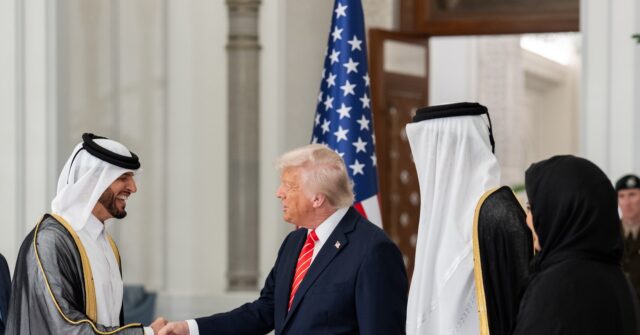Eight years ago, President Donald Trump visited Saudi Arabia and appeared to return empty-handed.
True, he made the first-ever flight directly from Riyadh to Tel Aviv. And he prayed at the Western Wall, becoming the first sitting president to do so, acknowledging Israeli sovereignty over the holiest site in Judaism.
But there were no big peace deals, and he did not announce that he was moving the U.S. embassy to Jerusalem.
Seven months later, Trump recognized Jerusalem as Israel’s capital, and signed the order to move the U.S. embassy. That kicked off a process that led, ultimately, to the Abraham Accords, and peace between Israel and several Arab states.
The lesson: give Trump time to work out his deals, especially in a region where the issues are complicated, and where the Arab world in particular wants to be approached on its own terms.
This week, Trump’s latest trip to the Middle East also seemed, at first, like something of a bust.
The Saudis did not agree to join the Abraham Accords, as some had expected. The Iranian-backed Houthis, far from being deterred, continued firing missiles at Israel. Trump met the jihadist-turned-president of Syria and lifted U.S. sanctions on that country — even as Christians, Druze, and other minorities feared persecution. And a looming deal with Iran appeared, frmo media reports, to be little different from Obama’s failed deal.
These positions seemed uncharacteristically weak, at least for Trump.
True, the week began with the supposedly unconditional release of American-Israeli hostage Edan Alexander as a “goodwill” gesture by Hamas. Then it emerged that Israel might have been pushed to accept, or consider, a lengthy ceasefire in Gaza in return.
There were trillion-dollar commitments by Saudi Arabia and Qatar to invest in the U.S., but many suspected Qatar’s $400 million “gift” of a presidential jet came with strings.
The overall impression, at least initially, was that the Trump administration was too eager to reach deals, so that it could claim some diplomatic successes to the American public.
There were also alarming — and, it later transpired, likely inaccurate — reports that U.S. Special Envoy Steve Witkoff had privately blamed Israeli Prime Minister Benjamin Netanyahu, suggesting that the U.S. was deliberately distancing itself from Israel.
Whether that was true or not, it became clear that U.S. interests might diverge from Israeli interests, simply because the U.S. prefers stability — and because Israel is willing to take risks for security, even at the price of instability.
That is a healthy difference, one that illustrates — as if it were ever in doubt — that Trump puts America first, and that the alliance with Israel is based on mutual values and interests, not paranoid fantasies of control.
The same applies to Israel, which is capable of acting on its own. While the separate U.S. ceasefire did not stop the Houthis from attacking Israel, it also did not require Israel to stop attacking the Houthis, or even Iran.
An Israeli airstrike that took out Hamas’s new leader during Trump’s trip emphasized that Israel retains freedom of action.
Still, some Israelis were worried about Trump’s approach, as his trip began.
But things turned around, rather dramatically. Witkoff made a personal visit to Hostage Square in Tel Aviv — where Netanyahu is often the target of demonstrations — and praised Netanyahu for his pressure to achieve Alexander’s release.
Then Trump delivered an extraordinary speech to the Gulf Cooperation Council (GCC) in which he slammed Palestinian leadership in Gaza and said any Iran deal would depend on an end to terror.
The latter is a key point. Netanyahu had warned Congress in 2015 that President Barack Obama’s proposed nuclear deal with Iran would fail unless the U.S. stopped Iran from supporting terrorists and picking fights with its neighbors.
Those two elements were still missing from U.S. demands until Trump made them explicit on Wednesday — and did so openly, in the presence of all of the Arab leaders, with admirably frank language.
Trump’s meeting, and handshake, with new Syrian leader Ahmed al-Sharaa, drew criticism, as did Trump’s later praise for al-Sharaa’s character and good looks.
But the warm standing ovation that greeted Trump when he told investors in Saudi Arabia that he was lifting sanctions offered a clue to the importance of Trump’s gesture: he opened the gates to Arab investment in Syria, even as Israel has destroyed its military capacity.
With Syria unable to threaten its neighbors — except through the anarchy that might yet be exploited by terrorist militias — the best, and the only, way forward for Syria is through economic growth, led by Gulf investment.
Moreover, Trump reportedly told the Syrian leader that he should join the Abraham Accords and seek peace with Israel. A visit to Damascus by Hasidic Jewish reporter Jake Turx suggested that Syria might, amazingly, be ready for that.
Supporters of Israel worried that Trump’s visit notably excluded the Jewish state.
But it might have been necessary for Trump to focus on the Arab world first, which is tougher to persuade.
Recall that in 2017, the fruits of Trump’s first Saudi visit were only apparent much later.
Wait and see: good things may be coming.
Joel B. Pollak is Senior Editor-at-Large at Breitbart News and the host of Breitbart News Sunday on Sirius XM Patriot on Sunday evenings from 7 p.m. to 10 p.m. ET (4 p.m. to 7 p.m. PT). He is the author of Trump 2.0: The Most Dramatic ‘First 100 Days’ in Presidential History, available for Amazon Kindle. He is also the author of The Trumpian Virtues: The Lessons and Legacy of Donald Trump’s Presidency, now available on Audible. He is a winner of the 2018 Robert Novak Journalism Alumni Fellowship. Follow him on Twitter at @joelpollak.
Read the full article here


